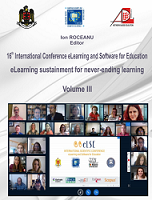DICTIONARY CONSULTATION HABITS OF ROMANIAN LEARNERS OF ENGLISH AT UNIVERSITY LEVEL
DICTIONARY CONSULTATION HABITS OF ROMANIAN LEARNERS OF ENGLISH AT UNIVERSITY LEVEL
Author(s): Ruxandra VișanSubject(s): Foreign languages learning, Applied Linguistics, Lexis, Distance learning / e-learning
Published by: Carol I National Defence University Publishing House
Keywords: mextalexicography; EFL; dictionary preference; frequency of dictionary use; bilingual lexicography;
Summary/Abstract: The present paper focuses on the field of dictionary use, and examines frequency of dictionary consultation as well as dictionary preference among Romanian learners of English. Representative research on dictionary use includes Tomaszczyk (1979) and Wingate (2002) (see also Lew 2004 for an overview of the literature on dictionary consultation habits). While there has been significant research concerning dictionary use, the dictionary consultation habits of Romanian learners have been understudied (with few exceptions, see Vișan 2018). Taking its cue from existing studies such as Atkins and Varantola (1998) which have found a correlation between dictionary use and proficiency level, the present paper focuses on a group of 214 Romanian students of EFL who major in English at the University of Bucharest, with two levels of English proficiency, namely B1 (95 students) and C1 (109 students). The paper shows that, as previous metalexicographers have underlined in studies focussing on foreign language learners, there appears to be a tendency among higher-proficiency learners to employ monolingual dictionaries more than bilingual dictionaries. This tendency occurs on the backdrop of a preference of the selected group of Romanian students, regardless of their level of proficiency, for monolingual dictionaries of English. The paper goes on to offer a detailed discussion of the context in which Romanian learners of English consult dictionaries at university level, attempting to identify the major factors which influence their lexicographical choices. The paper argues that the limited range of choice regarding bilingual dictionaries for Romanian learners of English (especially Romanian-English ones) can be seen as influencing the preference of Romanian students for monolingual dictionaries.
Journal: Conference proceedings of »eLearning and Software for Education« (eLSE)
- Issue Year: 16/2020
- Issue No: 03
- Page Range: 491-497
- Page Count: 7
- Language: English

